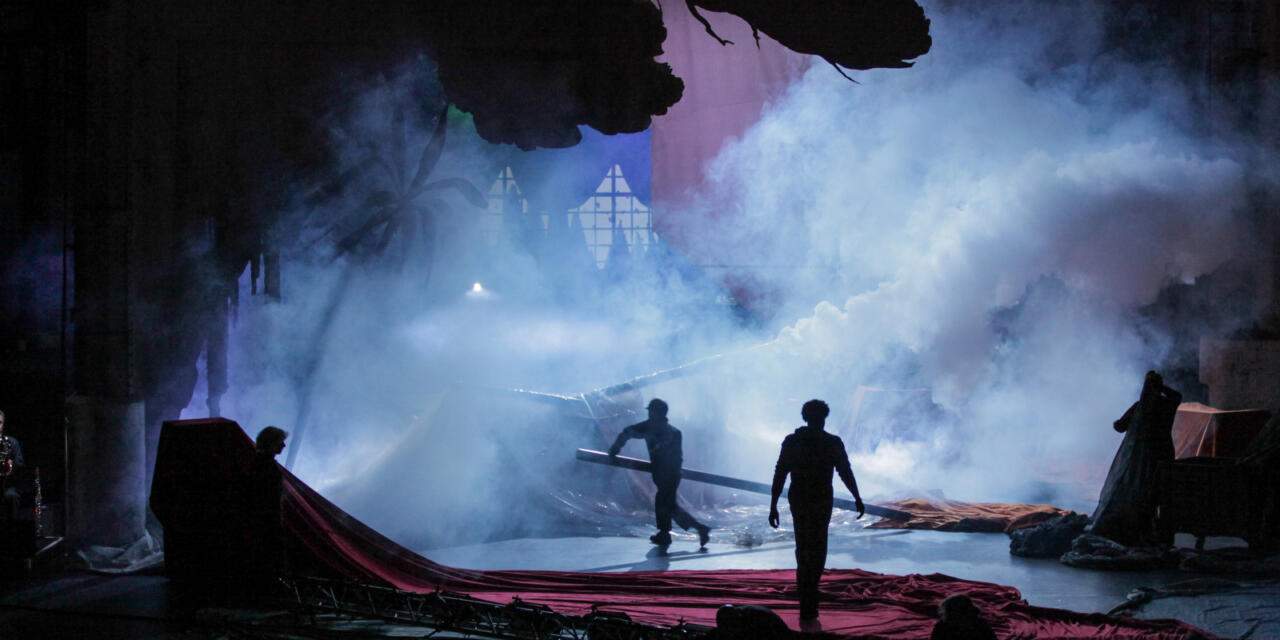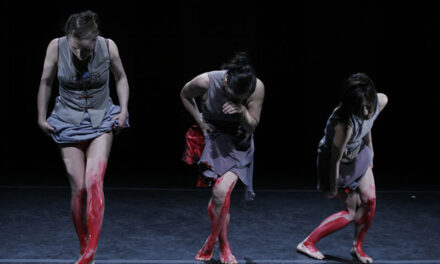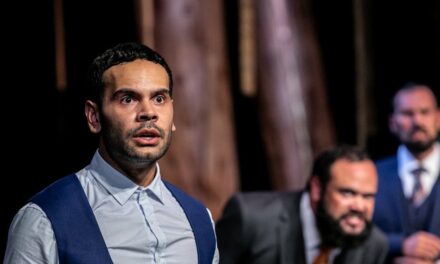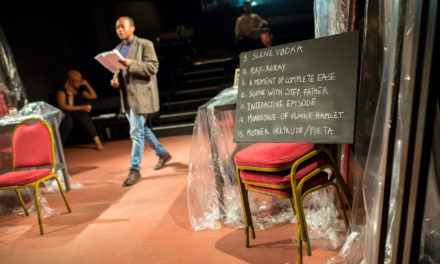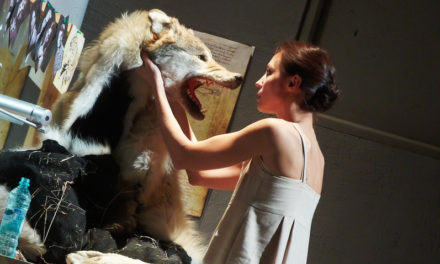When the world is engulfed in flames of enmity, would another flame be superfluous? Not if it is the flame of the Olympic fire, the fire of art. It can be salutary, transformative and graceful. The Theatre Olympics 2023 (1 April – 1 July) has a huge overarching purpose. Not only because it is an event with a triple anniversary meaning – the 10th Theatre Olympics will be enveloped by the aura of the 200th anniversary of the outstanding Hungarian poet, thinker and playwright Imre Madách and the 140th anniversary of the first production of his magnum opus, The Tragedy of Man. But the point here is not just beautiful numbers, but symbolism and the intertwining of meanings: today, when we exist in a state of total human tragedy, the spark of the theatre art becomes that guiding star of hope, illuminating our way in the gloom of news, scary photos and videos of world cataclysms and upheavals.
Imre Madách’s large-scale literary canvas looks to the future, about which the author had no particular illusions. In the play, the author guides his characters Adam and Eve through the whirlwinds of history, changing geography, utopias, strokes of fate, space and even an ice age with biblical sweep. Lucifer becomes the leader of men with one goal in mind – to kill faith in them. But he does not succeed. The sense of despair and powerlessness of today often brings to mind the death of faith and trust within us. The organizers of the 10th Theatre Olympics sensed this tone of the times very precisely and chose a very precise motto – an appeal to man: “O Man, strive on, strive on, have faith; and trust!” This is a quote from The Tragedy of Man, in which, despite all the collapses and falls, the light of faith and resistance to despair shines. The current Olympic Games, which are waking up this spring, promise to be so luminous. Time will tell whether it will succeed, but it is already clear that its light will be blindingly bright and inviting.

Nora (Attis Theatre). Press photo.
The ark, the symbol of this year’s Theatre Olympics, embodies the biblical message and voice of salvation. The performances will run from Easter to Midsummer’s Eve and will also trace a kind of sacral arc. Attila Vidnyánszky, director of National Theatre, Budapest, who together with his colleagues organized MITEM (Madách International Theatre Meeting) in 2014 with the aim of putting Hungary on the world theatre map of today, explains the message: ‘To use the biblical parallel, we board the ark to save ourselves and our values. <…> These times of crisis make it even more important to save our values through the imaginary ark of the theatre. Culture helps maintain the bridges of dialogue that politics destroys.
The previous Theatre Olympics 2019 took place in Russia, in St Petersburg and in Toga, Japan. Its motto was ‘Creating Bridges’. Today, looking at the footage of blown-up bridges in Ukraine and watching the collapsed ties between countries and people, one thinks of that motto with bitter irony. The 2023 Olympiad is a particularly responsible, post-traumatic Theatre Olympics, because it reflects the experience of a fracture not only in world harmony, but also in the theatrical fracture. The pandemic that has forced the rethinking, the loss, in order to regain the art of theatre will certainly be reflected in this world reporting event. The Theatre Olympics is not just a celebration of theatre, but also a preview of what theatre art has come to in the interim. There is no rivalry and struggle (except perhaps for hearts, souls and minds of spectators) as it happens at sports Olympiads, here each of the performances and events are integrated into the whole mosaic of art. Apart from aesthetics and awakening a sense of beauty in human beings, the Theatre Olympics is distinguished by its ethical component of humanism and multiculturalism, social responsibility and sincere striving to restore world harmony. This goal cannot be achieved without art.
There is no doubt that the Hungarian edition of the Theatre Olympics will be a special one, already by virtue of the impressive statistics. From April to July, four-hundred companies from fifty-eight countries will come to Hungary to present a festival of light, as bright as the light of software and eyes burning with love for art, in spite of all the gloom of non-theatre. The seven hundred and fifty performances, in which seven-thousand and five-hundred, performers will be involved, suggest a potential record for the largest theatre festival at the moment! Needless to say, all theatre genres apart from the boring ones will fit in here. However, it was not the numbers but the quality and high artistic criteria of the performances that determined the selection of the Jubilee Theatre Olympics.
The Theatre Olympics is opening its friendly arms wide, embracing literally the entire country: The theatres in Budapest and all over Hungary will join the Hungarian Olympics, and they will host one production from abroad and one from a transborder Hungarian theatre – the choice of which is up to them. Thus the “fourth wall” disappears not only between the production and the public, but also between the theatres in the capital and the provinces. The Theatre Olympics is meant to unite rather than divide and isolate -, to create new connections, including many international ones.
Founder of the Theatre Olympics, Theodoros Terzopoulos discusses the cross-cutting theme of the upcoming event: “We always try to find a leading theme for the Olympics, paying special attention to the cultural specificities of the host country. For example, the role of small and large communities and nations in a globalising world can be an exciting theme these days. Nowadays, everyone is trying to get ahead individually, which threatens the particular values of peoples and nations. It works against diversity. It is our duty to cherish our collective treasures.
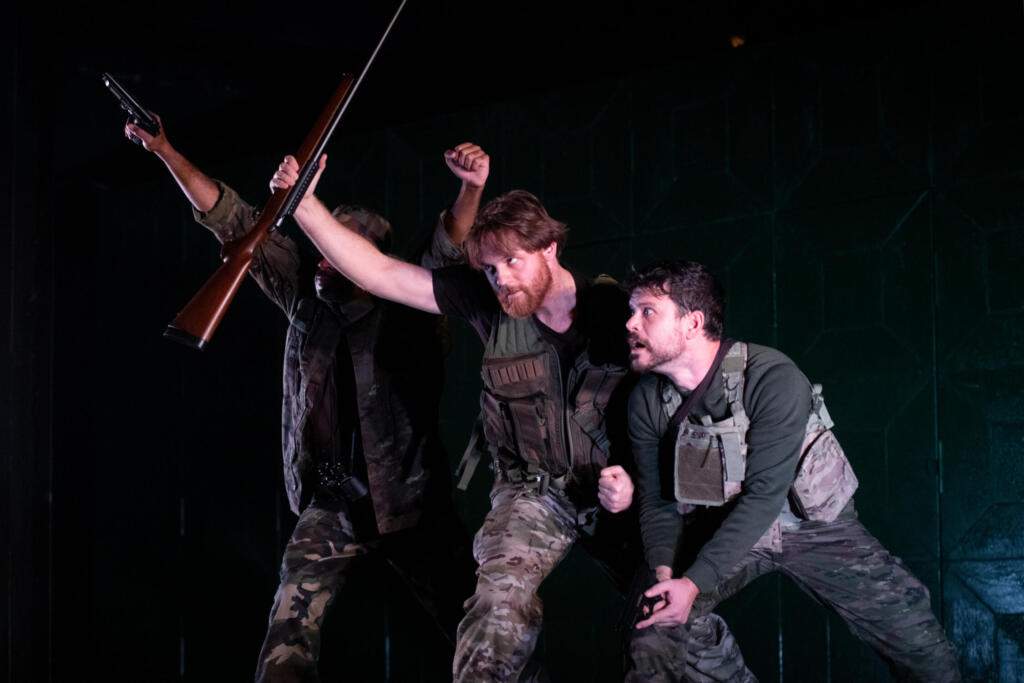
Life is a dream (Cheek by Jowl). PC: Javier Naval.
The heart of the Olympics will be the ‘festival within a festival’ – the 9th MITEM. It has a very special program and a signature tone. It is a case in which the names of the productions are not so important as the names of their authors, each of whom has made a chapter in world theatre history: Suzuki Tadashi, Theodoros Terzopoulos, Heiner Goebbels, Romeo Castellucci, Eugenio Barba, Alessandro Serra, Declan Donnellan to name but a few. There are no ordinary names here, and there is no doubt that there will be no empty seats in the theatre rows for performances. Except for those moments when the audience will give a standing ovation, which, judging by the festival’s colorful picture, is to be expected.
Sometimes, the anticipation of a holiday is better than the holiday itself. The Theatre Times will tell you about what is to come, but we can already say who will not be at the Theatre Olympics. Attila Vidnyánszky, director, and artistic director of the 10th Theatre Olympics: “Our Ukrainian friends, who have been to MITEM several times, have seen their theatre life come to a halt – but as soon as things are back to normal, we will make it possible for them to attend the Olympics in the spring, even at the last minute. And we won’t be able to see Russian performances either. As soon as the political situation is right, we will host Russian artists again”. And as often happens in life – everything is indeed decided at the last minute. The Ukrainian Ivan Franko National Drama Theater will be present at the Theatre Olympics with The Resistible Rise of Arturo U” and Caligula. Brecht and Camus are not only significant, but also a symbolic choice. Certainly these productions have a special overarching purpose today.
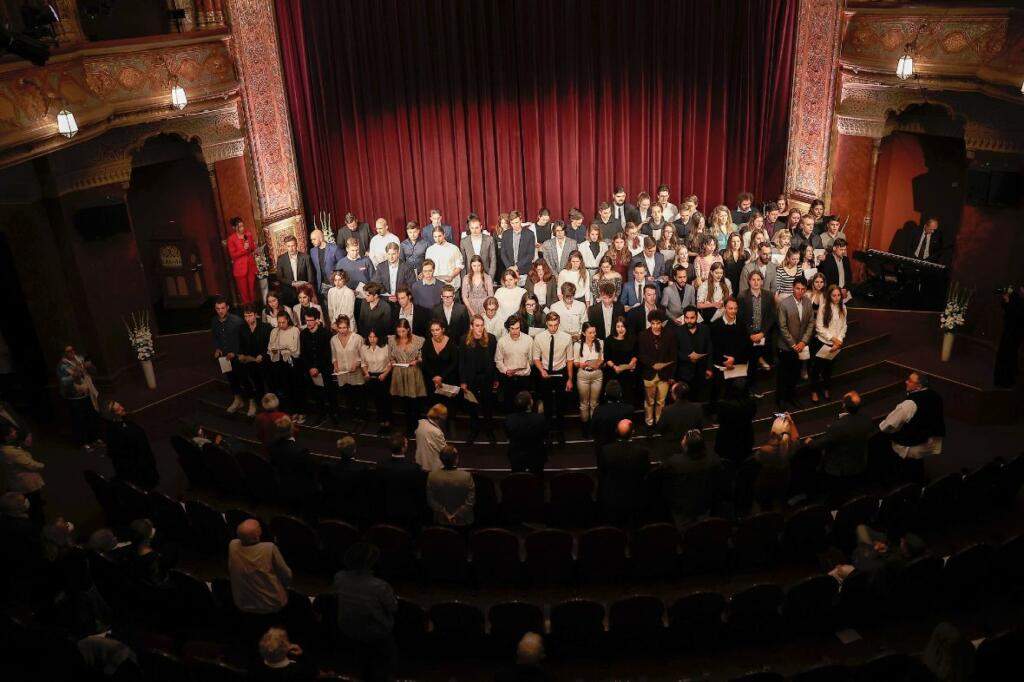
Színház-és Filmművészeti Egyetem
Reaffirming once again that theatre is a total art, the Theatre Olympics offers a unique project implemented by the University of Theatre and Film Arts. Just as each subsequent Theatre Olympics takes up the baton from the previous one, representatives of Hungarian and Hungarian theatre will prepare extracts from The Tragedy of Man to bring them together to create a theatre experience. The university will give each participating institution the opportunity to present its own version of their scenes from the play at the two-day Madách conference in early June. Following the conference, Attila Widnjanski will spend two weeks working intensively with students, and by the end of June he will have brought together single scenes from France, England, Poland, Greece, Turkey, Georgia and Canada and other countries into a greater whole. Different interpretations in different languages will paint a single theatrical canvas that will conclude the Theatre Olympics and at the same time mark the start of preparations for the next one. Like no other art form, theatre strives to transcend its own boundaries, to absorb the beginnings and conquests of different arts and disciplines. Theatre becomes an ‘assemblage point’ where different art forms meet. Supporting this metaphorical thread of the times is Stage designer János Mira’s installation that uses archive material from the Hungarian Theatre Museum and Institute. A metaphorical tunnel in which fifteen screens will be installed to immerse the audience in a space inspired by cinematic and theatrical versions of The Tragedy of Man by Imre Madách. Ivan Uryvskyi will direct the closing performance of the festival, Shakespeare’s Midsummer Night’s Dream with the cast of the National Theatre, Hungary, directed by Ivan Uryvskyi. But it seems that the effect of this year’s Theatre Olympics, which has a grand scale and plans, is such that you won’t want to wake up from this sweet theatrical experience again for a long time.
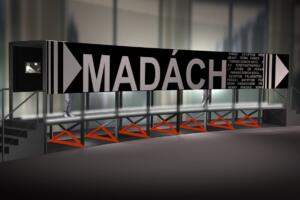
Press photo.
The Trojan Women, Young Barbarians, Electra, Richard III, Othello, Macbeth, Caligula, Bros, War and Peace and Everything that Happened and Would Happen – these titles alone add up the bizarre pictures of this day and age, where revived characters from classical tragedies and dramas at times dominate our lives. Seeing their fates on stage makes it easier for us to experience the events and proposed circumstances in which we ourselves operate. The spectacle triumphs over the darkness of the auditorium, as life triumphs over death. The Theatre Olympics seek to remind us that there is a theatre that reflects current problems and seeks out the correct solutions. Not alienated from life but involved in it. And there is an audience that is inquisitive and insistent on not looking, but seeing. As long as there is applause, as long as flowers fly onto the stage, as long as shouts of “Bravo” are heard, in a true temple of art, the theatre is alive; a mirror for our lives, which means that all of us who “in his time plays many parts“, are alive too. It’s amazing how theatre, a space of illusion and fiction, becomes a space of truth in dramatic times. It’s sometimes not easy to believe in tomorrow, but you want to believe in theatre. «O Man, strive on, strive on, have faith; and trust!»
See you all at the theatre, see you all in Hungary!
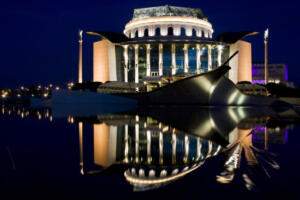
National Theatre Budapest Hungary. Press photo.
This post was written by the author in their personal capacity.The opinions expressed in this article are the author’s own and do not reflect the view of The Theatre Times, their staff or collaborators.
This post was written by Emiliia Dementsova.
The views expressed here belong to the author and do not necessarily reflect our views and opinions.

